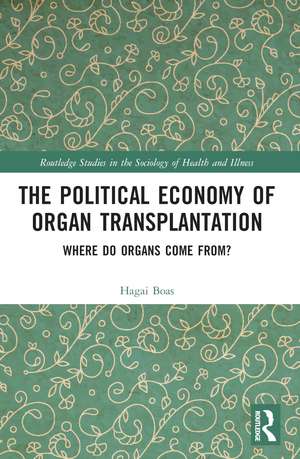The Political Economy of Organ Transplantation: Where Do Organs Come From?: Routledge Studies in the Sociology of Health and Illness
Autor Hagai Boasen Limba Engleză Paperback – 27 mai 2024
This innovative work combines a rigorous academic analysis of the political economy of organ supply for transplantation with autobiographical narratives that illuminate the complex experience of being an organ recipient.
Organs for transplantations come from two sources: living or post-mortem organ donations. These sources set different routes of movement from one body to another. Postmortem organ donations are mainly sourced and allocated by state agencies, while living organ donations are the result of informal relations between donor and recipient. Each route traverses different social institutions, determines discrete interaction between donor and recipient, and is charged with moral meanings that can be competing and contrasting. The political economy of organs for transplants is the gamut of these routes and their interconnections, and this book suggests how such a political economy looks like: what are its features and contours, its negotiation of the roles of the state, market and the family in procuring organs for transplantations, and its ultimate moral justifications. Drawing on Boas’ personal experiences of waiting, searching and obtaining organs, each autobiographical section of the book sheds light on a different aspect of the discussed political economy of organs – post-mortem donations, parental donation, and organ market – and illustrates the experience of living with the fear of rejection and the intimidation of chronic shortage.
A Political Economy of Organ Transplantation is of interest to students and academics with an interest in bioethics, sociology of health and illness, medical anthropology, and science and technology studies.
| Toate formatele și edițiile | Preț | Express |
|---|---|---|
| Paperback (1) | 259.98 lei 6-8 săpt. | |
| Taylor & Francis – 27 mai 2024 | 259.98 lei 6-8 săpt. | |
| Hardback (1) | 932.52 lei 6-8 săpt. | |
| Taylor & Francis – 9 sep 2022 | 932.52 lei 6-8 săpt. |
Din seria Routledge Studies in the Sociology of Health and Illness
- 5%
 Preț: 295.91 lei
Preț: 295.91 lei -
 Preț: 311.37 lei
Preț: 311.37 lei - 5%
 Preț: 295.02 lei
Preț: 295.02 lei -
 Preț: 327.41 lei
Preț: 327.41 lei - 18%
 Preț: 1162.84 lei
Preț: 1162.84 lei - 5%
 Preț: 364.25 lei
Preț: 364.25 lei - 18%
 Preț: 844.18 lei
Preț: 844.18 lei -
 Preț: 383.63 lei
Preț: 383.63 lei - 5%
 Preț: 364.80 lei
Preț: 364.80 lei - 18%
 Preț: 999.46 lei
Preț: 999.46 lei - 18%
 Preț: 1000.30 lei
Preț: 1000.30 lei - 5%
 Preț: 373.96 lei
Preț: 373.96 lei - 5%
 Preț: 1157.77 lei
Preț: 1157.77 lei - 21%
 Preț: 247.51 lei
Preț: 247.51 lei - 5%
 Preț: 1161.59 lei
Preț: 1161.59 lei - 5%
 Preț: 363.00 lei
Preț: 363.00 lei -
 Preț: 389.66 lei
Preț: 389.66 lei - 17%
 Preț: 278.34 lei
Preț: 278.34 lei - 26%
 Preț: 764.78 lei
Preț: 764.78 lei - 18%
 Preț: 999.02 lei
Preț: 999.02 lei -
 Preț: 389.66 lei
Preț: 389.66 lei - 13%
 Preț: 335.49 lei
Preț: 335.49 lei - 5%
 Preț: 1284.09 lei
Preț: 1284.09 lei -
 Preț: 389.38 lei
Preț: 389.38 lei -
 Preț: 389.38 lei
Preț: 389.38 lei -
 Preț: 394.19 lei
Preț: 394.19 lei - 18%
 Preț: 1057.89 lei
Preț: 1057.89 lei - 18%
 Preț: 1028.18 lei
Preț: 1028.18 lei - 18%
 Preț: 1000.27 lei
Preț: 1000.27 lei - 5%
 Preț: 369.92 lei
Preț: 369.92 lei - 5%
 Preț: 1410.27 lei
Preț: 1410.27 lei - 18%
 Preț: 1000.27 lei
Preț: 1000.27 lei - 12%
 Preț: 318.90 lei
Preț: 318.90 lei - 18%
 Preț: 1001.07 lei
Preț: 1001.07 lei - 18%
 Preț: 996.33 lei
Preț: 996.33 lei - 18%
 Preț: 1001.39 lei
Preț: 1001.39 lei - 18%
 Preț: 996.96 lei
Preț: 996.96 lei - 5%
 Preț: 453.68 lei
Preț: 453.68 lei
Preț: 259.98 lei
Preț vechi: 311.41 lei
-17% Nou
Puncte Express: 390
Preț estimativ în valută:
49.75€ • 51.32$ • 41.51£
49.75€ • 51.32$ • 41.51£
Carte tipărită la comandă
Livrare economică 26 martie-09 aprilie
Preluare comenzi: 021 569.72.76
Specificații
ISBN-13: 9781032331119
ISBN-10: 1032331119
Pagini: 214
Ilustrații: 10
Dimensiuni: 156 x 234 mm
Greutate: 0.45 kg
Ediția:1
Editura: Taylor & Francis
Colecția Routledge
Seria Routledge Studies in the Sociology of Health and Illness
Locul publicării:Oxford, United Kingdom
ISBN-10: 1032331119
Pagini: 214
Ilustrații: 10
Dimensiuni: 156 x 234 mm
Greutate: 0.45 kg
Ediția:1
Editura: Taylor & Francis
Colecția Routledge
Seria Routledge Studies in the Sociology of Health and Illness
Locul publicării:Oxford, United Kingdom
Public țintă
Postgraduate and Undergraduate AdvancedCuprins
1.Exercising Shortage. 2.The making of Utopia and Dystopia in Organ Transplantations. 3.Living and Deceased Organ Economies. 4.Global Organ Economy. 5.The New Ethics of Organ Donations. 6.Contested Bioethics: The History of Organ Tranplantaions in Israel. Epilogue: When The Shortage Ends.
Notă biografică
Hagai Boas is a sociologist of health and an organ recipient. He is positioned as the director of the Science, technology and Society unit at Van Leer Jerusalem Institute and is an adjunct senior lecturer at Ben Gurion University of the Negev. His fields of interest include the sociology of transplant medicine and bioethics.
Descriere
This innovative work combines a rigorous academic analysis of the political economy of organ supply for transplantation with autobiographical narratives that illuminate the complex experience of being an organ recipient.
